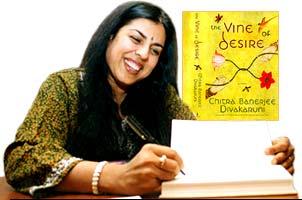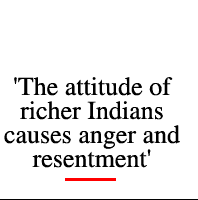

Moving away from novels probing immigrant women's lives, Chitra Banerjee Divakaruni, author of such books as Sister of My Heart, has published two books for young readers in the past two years.
The Conch Bearer, an adventure of young Anand's trials while trying to retrieve an irreplaceable conch shell, follows Neela: Victory Song. The latter celebrates the heroism of India's freedom fighters.
Both books are set in India.
With so many fantasies being published, what is special about this one, asked the Booklist about The Conch Bearer. 'It's the unique setting, along with the elegance of Divakaruni's writing,' wrote reviewer Ilene Cooper. 'The slums are so richly created that readers can almost smell them, and the pure beauty of Anand's destination is a shimmering Shangri-La come to life. This speaks directly to children, in a very enticing voice.'
The writer has been published in over 50 magazines, including The Atlantic Monthly and The New Yorker. Her work has been translated into 11 languages, including Dutch, Hebrew and Japanese.
Divakaruni, 47, who teaches the Creative Writing program at the University of Houston, was a judge for the National Book Awards three years ago. She spoke to Senior Editor Arthur J Pais.
How did the idea for the children's books come about?
There were two reasons for the children's books. My sons wanted me to write a book they could read. They wanted something magical. Being an Indian writer and having such a wonderful heritage of magical literature behind me, I wanted to make sure my books were set in India. That is partly the impetus behind Conch Bearer.
Neela is a novel set during the heroic Indian Independence struggle in 1939. I wanted Indian-American children to read these books, become aware of their history and culture, and relate to characters that came from the same ethnic background.
After 9/11 I felt a great need to expose children of America to a book with Indian characters. There were a number of hate crimes against people of Indian origin.
They happened because people were ignorant about our community. I wanted children to learn about our culture, become comfortable with it, admire and enjoy the children who are the heroes and heroines of these books. I hope this will lead to a greater understanding and less prejudice and suspicion between cultures.
Are more books for children on the way?
There are more books, but they are a secret for now!
Was writing these two books a diversion from plotting the heavier, more emotional novels?
Yes, it was a lot of fun to play with the situations and the plot. It was also great fun to involve my children by reading out sections to them and getting their opinions.
What is the novel you are working on?
I am working on an adult novel about a dream interpreter who is Indian but lives in America and her relationship with her daughter.
What is the working title of the book and when do you have to submit it to the publisher?
I have called it Queen of Dreams. I have to submit it by the year-end.
Where is it set?
In the (San Francisco) Bay Area.
Your books are set in the Bay Area. Don't you want to write a New York book?
I have lived in Houston and the San Francisco Bay Area for many years. Houston has appeared in one book. I have to know a place very well before I write about. I know so little of New York.
Who do you write for?
By now, I know my readers -- they belong to a diverse group. Indian-Americans read my books because they recognise some of their immigrant experience in these books. They want to know how I look at similar experiences. Other ethnic readers find similarities to their experiences in my books too. There are people who are interested in India and Indian-American experiences in this country. I am aware of this. But when I write, I try to make the best books they can be.
Which interesting books have you read recently?
I read Jhumpa Lahiri's The Namesake and admired it.
What did you get out of it?
I like the way she uses details, very quiet details but they are so very accurate. She uses language that seems simple and plain but it is very precise and very artistic.
Your children are growing up in a multicultural America. Yet there is a lot of pettiness, racism and bad things out there at school and outside. How have you tried to prepare your sons to face such things?
This is a dilemma many parents go through. It is very hard to prepare children to face the problems. I am afraid if we tell them about negative things, they may get overwhelmed and develop a negative attitude towards the world. They may not even face these problems. But we tell our sons that any problems they face, anything that makes them uncomfortable, they should discuss them with me and their father.
Our children attend Chinmayananda Mission programmes, where they get insights into Indian culture and the Hindu religion. They also get empowered.
What are some of life's lessons you share with your students?
I have been teaching for nearly 18 years. I have told them to always be observant and listen carefully. Often we go through life without paying keen attention to the world around us. I tell them that I would not be able to write anything if I do not listen and observe.
What do you learn from them?
I am often surprised to see how they think differently from me. I gain new perspectives from listening to them and discussing books and writers, among other things, with them. We think we know the best in this business but we are continually challenged. Gaining new perspectives is one way of growing.
Many Indian-Americans get too self-conscious and angry when they see a fellow desi talk about problems in India, about women, dowry deaths and poverty. You have encountered such criticism too. Have you become immune to it?
I don't know if one ever becomes immune to such attacks. I realise now that if one is going to write about controversial issues, one will attract some anger. But I have to write about what I feel strongly about, and one of these is the complicated position of Indian women, their challenges. I write about many positive things too, about strong family bonds and the courage of people who find themselves in a very different world after immigration. I portray Indians in a balanced light and overall the responses have been very positive.
What are some of the great strengths of the Indian community in the US?
Our strong family bonds. Also our spirituality, our deep connection to our roots, our rich heritage. We are learning to network and help each other more than before. We are also a very successful community, intelligent and hardworking.
And the weaknesses?
There is right now a growing split between rich professional Indians and working class Indians (in America). Many people in the first group are snobbish and do not want to associate with the second.
They do not want to acknowledge problems the second group faces. They don't want to take the time and trouble to help them. They don't see that we are all one community. If one part of us is weak, if one part is suffering, we all eventually suffer. This attitude of the richer Indians causes anger and resentment among many working class Indians.
This may become a real problem if it isn't addressed soon.
What is the ultimate book you want to write?
I have no such book in mind. I always think of the project I am working on is the ultimate book. I am not consciously holding back anything. I go from project to project and give my best to each one of them.
Photograph: Paresh Gandhi. Image: Uday Kuckian





